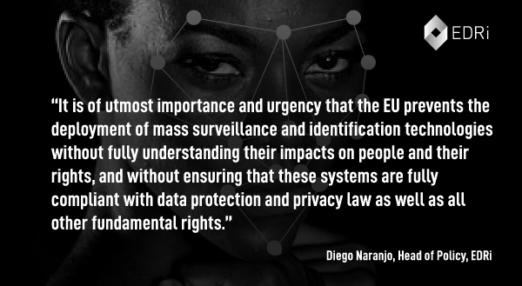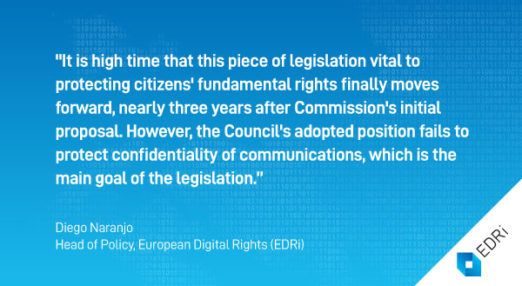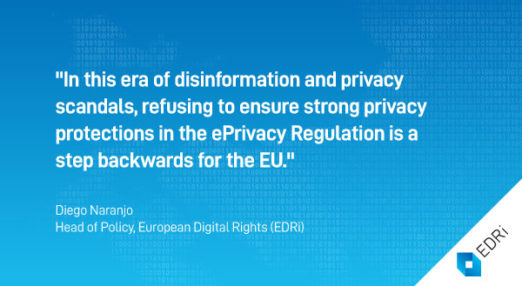ePrivacy Regulation
Filter resources
-

EDRi calls for fundamental rights-based responses to COVID-19
Some of the actions taken by governments and businesses under exceptional Coronavirus circumstances today, can have significant repercussions on freedom of expression, privacy and other human rights both today and tomorrow.
Read more
-

A human-centric internet for Europe
The European Union has set digital transformation as one of its key pillars for the next five years. New data-driven technologies, including Artificial Intelligence (AI), offer societal benefits – but addressing their potential risks to our democratic values, the rule of law, and fundamental rights must be a top priority. “By driving a human rights-centric […]
Read more
-

Digitalcourage fights back against data retention in Germany
On 10 February 2020, EDRi member Digitalcourage published the German government’s plea in the data retention case at the European Court of Justice (ECJ). Dated 9 September 2019, the document from the government explains the use of retained telecommunications data by secret services, the question whether the 2002 ePrivacy Directive might apply to various forms […]
Read more
-

Data retention: “National security” is not a blank cheque
On 15 January, Advocate General (AG) Campos Sánchez-Bordona of the Court of Justice of the European Union (CJEU) delivered his opinions on four cases regarding data retention regimes in France, Belgium and the UK, in the context of these Members States’ surveillance programmes.
Read more
-

Indiscriminate data retention considered disproportionate, once again
EDRi’s initial reaction on the press release of the AG Opinion on data retention Today’s Court of Justice of the European Union (CJEU) Advocate General’s Opinions continue the firmly established case-law of the CJEU considering mass collection of individuals communications data incompatible with EU law. The Advocate General reaffirms that blanket retention of telecommunication data […]
Read more
-

NCC Report: Online advertising industry is out of control
Today, on 14 January 2020, the Norwegian Consumer Council (NCC), a consumers group active on the field of digital rights, denounces in their report “Out of Control” current practices of the adtech industry, including systematic privacy breaches and unlawful behavioural profiling. The report focuses on the analysis of data traffic from ten popular apps such […]
Read more
-

Bits of Freedom celebrates its 20th anniversary
EDRi member Bits of Freedom celebrates its 20 year anniversary. Bits of Freedom believes an open and just society is only possible when people can participate in public life without fear of repercussions. For this, every person needs to be free to share information and their private life needs to be respected. The right to […]
Read more
-

Why privacy is particularly crucial for people with disabilities
With data being described as the “new currency”, many questions arise around privacy and data protection. We all leave increasingly larger data footprints as we use more, and more advanced technologies. We let apps access our phonebook contacts, track our habits and behavior, and know our preferences. At other times, we do not even have […]
Read more
-

EU Council moves the ePrivacy reform forward – with major flaws in its position
Read more
-

ePrivacy: EU Member States push crucial reform on privacy norms close to a dead end
Today, on 22 November 2019, the Permanent Representatives Committee of the Council of the European Union (COREPER) has rejected the Council’s position on a draft ePrivacy Regulation. “In this era of disinformation and privacy scandals, refusing to ensure strong privacy protections in the ePrivacy Regulation is a step backwards for the EU,” said Diego Naranjo, […]
Read more
-

Twitter banning political ads – the tip of the iceberg
Twitter seems to have learnt the lessons of the 2016 US elections. After the revelation of the Cambridge Analytica scandal, the link between the use of social media targeted political advertisement and the voting behaviour of specific groups of people has been explored and explained again and again. We now understand how social media platforms […]
Read more
-

The sixth attempt to introduce mandatory SIM registration in Romania
A tragic failure by the police to save a teenage girl who was abducted but managed to call the 112 emergency number three times before she was murdered, led to the adoption of a new Emergency Ordinance in Romania. The law introduces several measures to improve the 112 system, one of which is mandatory SIM card registration for all prepaid users. Currently approximately ten million prepaid SIM cards are used in Romania.
Read more
